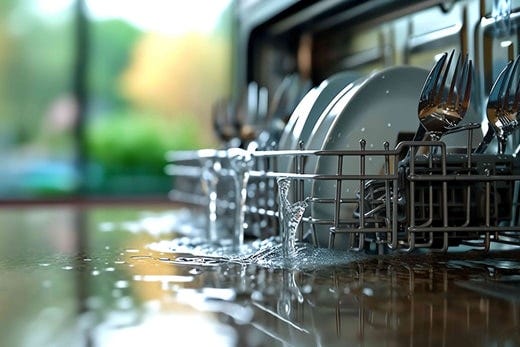
Impact of Water Quality on Dishwasher Performance

Dishwashers are an integral part of the fast-paced and modern world of the kitchen. They need to display efficiency and hygiene benefits while cleaning and sanitizing your dishes, utensils, and cookware.
But there’s one factor that can significantly affect the effectiveness and durability of these crucial appliances. Unfortunately, it is often overlooked!
That's right. The quality of the water running through your household plumbing and the dishwasher can significantly impact its performance and lifespan.
This blog post delves into the impact of water quality on dishwashers. Keep reading to learn how to identify hard water and permanently eliminate mineral hardness from your water.
The hidden enemy: hard water
Hard water contains high levels of minerals like calcium and magnesium, picked up as the water travels through soil and rock. The higher the mineral content, the harder the water.
While generally not harmful to health, these minerals can lead to limescale buildup in pipes and dishwashers, reducing their efficiency and lifespan.
Over time, these mineral deposits cling together, forming a greyish residue on the inside walls and interior components, impeding water flow and resulting in hard water stains on your dishes.
You can effectively counteract the effects of hard water minerals by using Finish Dishwasher Salt, which is specially designed to soften the water content and prevent hard water stains.
Learn about the benefits of using dishwasher salt, how it helps eliminate limescale from your dishwasher, enhances its performance, and ensures perfectly clean dishes every time.
Impact of water quality on dishwasher
Here’s how water quality can affect the efficiency and longevity of dishwashers.
1. Hard water scaling
This high-level mineral concentration of calcium and magnesium can accumulate in the various parts of the dishwasher over time.
This scale buildup can block the spray arms, nozzles, and heating elements, reducing their efficiency. Over time, this can lead to decreased cleaning performance and even premature failure of the dishwasher.
To reduce water hardness before it reaches the dishwasher, consider installing a water softener or conditioner. Additionally, regularly cleaning your dishwasher is necessary to prevent scale buildup.
2. Detergent performance
Hard water can impede detergent effectiveness as the minerals in it can interact with detergents, reducing their ability to create a rich lather and clean effectively.
When choosing dishwasher detergents, always remember to opt for the brand that guarantees spotless, sparkling, shiny dishes and is equipped with additives like Rinse Aid that effectively counteract the negative impacts of hard water conditions by preventing water spots on your dishes, ensuring brilliant shine on your glasses and dishes.
3. Corrosion
Excessive levels of chloride or chlorine in water can cause corrosion within the dishwasher's internal parts, including pumps, seals, and stainless steel surfaces.
It's crucial to ensure that the water going into the dishwasher isn't overloaded with chlorine. Using water treatment options like carbon filters can effectively lower the chlorine levels in the water supply.
4. Efficiency
Poor water quality can lead to ineffective cleaning cycles, causing dishes to remain unclean and requiring additional washing, resulting in wasted water, energy, and time.
Monitor and maintain your dishwasher's optimal performance regularly. Adjust the dishwasher programs and cycle settings as needed, and consider investing in an energy-efficient dishwasher model.
5. Electricity cost
When scale accumulates on your dishwasher's heating element, it acts as insulation, making it difficult to heat water efficiently.
This leads to increased energy usage as the dishwasher runs longer to achieve the desired water temperature, resulting in higher electricity bills. The added strain on the heating element can also lead to premature wearout and potential breakdowns.
.png?width=70&height=45&format=png&quality=50)


